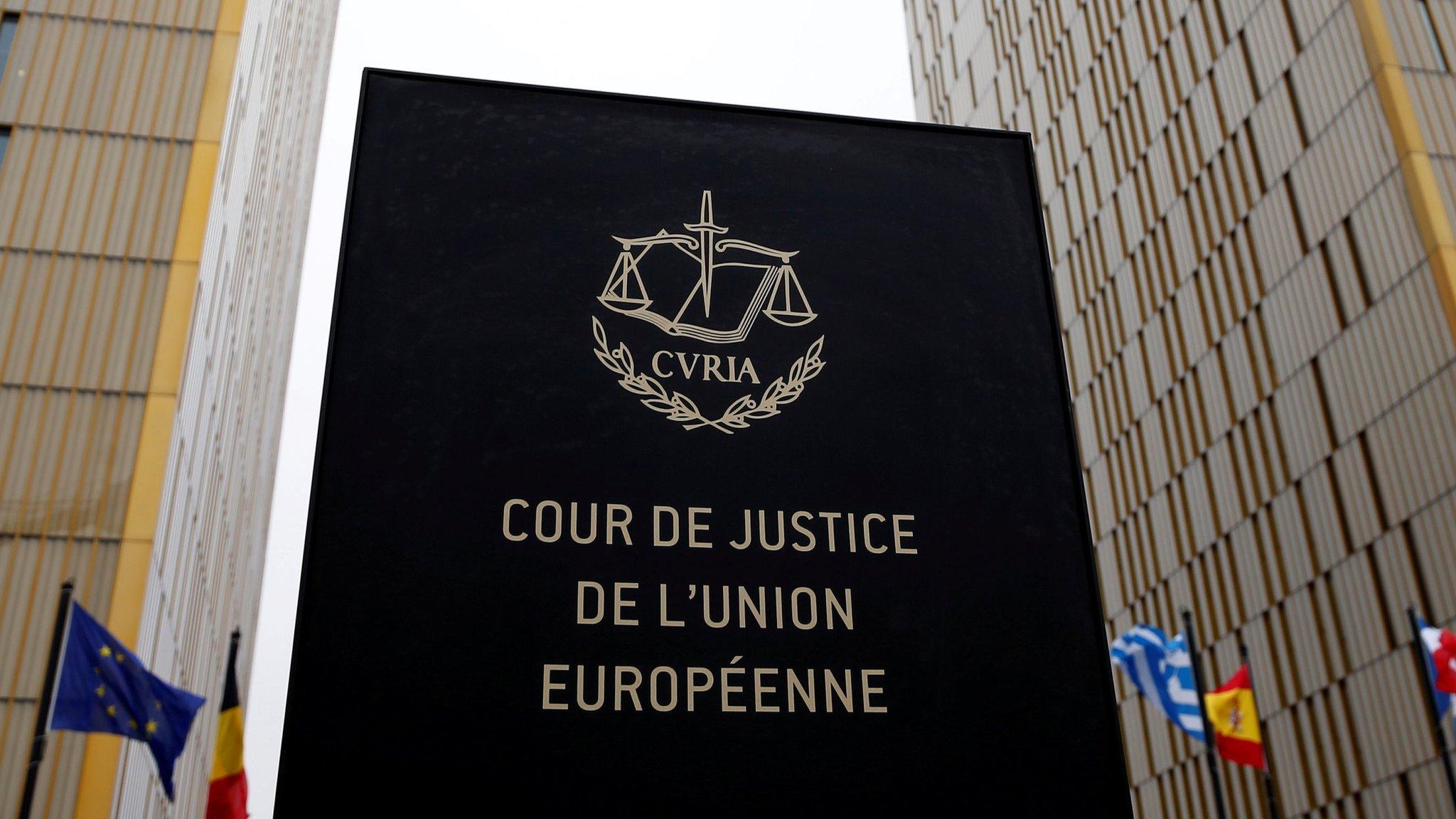Brexit: Theresa May says EU leaders 'determined' to solve Irish border issue
- Published
- comments
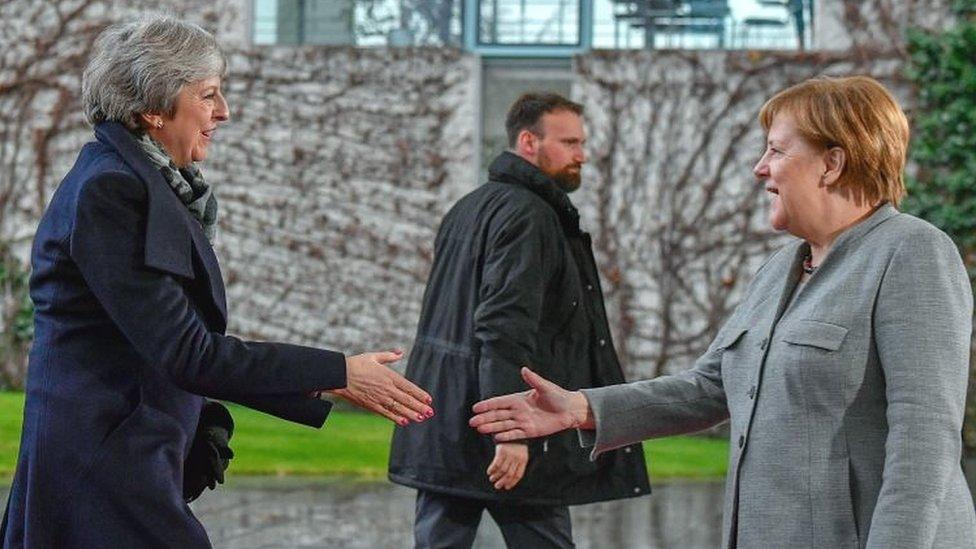
Theresa May says there is a "shared determination" among EU leaders to solve the Irish border problem preventing MPs from backing her deal.
She was speaking after meetings with German Chancellor Angela Merkel and Dutch Prime Minister Mark Rutte.
The prime minister says there can be no EU withdrawal deal without a backstop plan for the Irish border.
But she said she was seeking guarantees that it would be "only temporary" to address the concerns of her own MPs.
But Labour leader Jeremy Corbyn labelled Mrs May the "runaway prime minister" and said her trip was a "waste of time and public money".
The prime minister is now in Brussels for meetings with top EU officials Donald Tusk and Jean-Claude Juncker,
Mr Tusk, President of the European Council, tweeted: "Long and frank discussion with PM Theresa May ahead of Brexit summit. Clear that EU27 wants to help. The question is how."
Angela Merkel said the deal could not be re-negotiated but she was still optimistic a solution to the Irish border issue could be found.
What is Theresa May asking for?
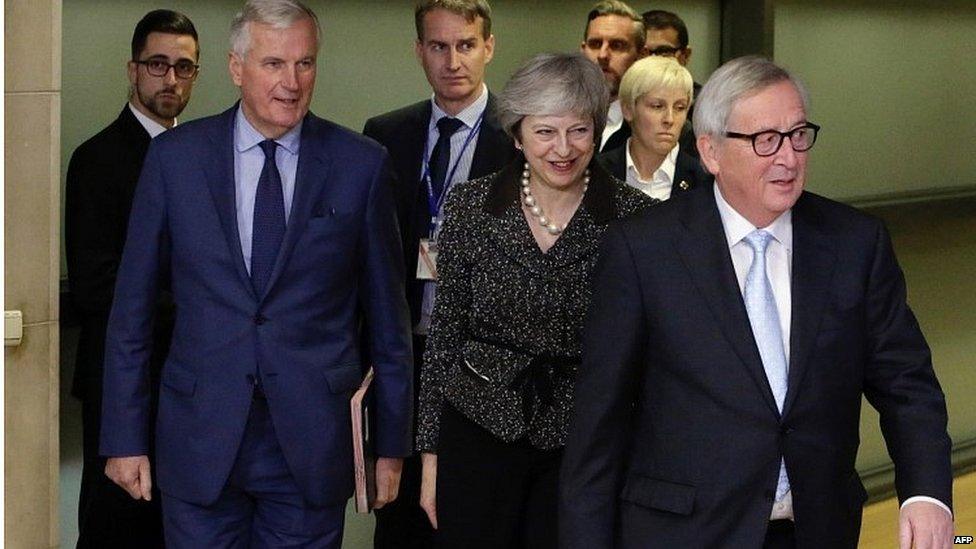
Critics object to the backstop - a temporary customs arrangement designed to prevent the need for checkpoints at the Irish border if a long-term solution that avoids them cannot be agreed - because it imposes different regulations in Northern Ireland from the rest of the UK.
They also object to the fact that under the terms of the withdrawal agreement, the UK can not exit the backstop without the EU agreeing.
After aborting Tuesday's planned vote on the deal, Mrs May is believed to be considering how to give the UK Parliament a vote on whether to enter the backstop - and an annual vote on whether the country should remain in it.
Ministers have suggested this could be done in an "addendum" to the withdrawal agreement, without changing the main text of it.
May I get out? PM's car door gets stuck
Speaking in Brussels, Mrs May said a backstop was "a necessary guarantee for the people of Northern Ireland".
"Whatever relationship you want with Europe in the future, there's no deal available that doesn't have a backstop within it.
"But we don't want the backstop to be used and if it is, we want to be certain that it is only temporary. And it is those assurances that I will be seeking from fellow leaders over the coming days."
Irish Prime Minister Leo Varadkar, who will welcome Mrs May to Dublin on Wednesday, said he hoped to reassure the UK without changing the fundamental substance of the withdrawal deal, including the backstop.
"Our approach is that we have a deal on the table," he told the Irish Parliament. "Our objective is to get the deal ratified by the House of Commons.
In other Brexit developments
Commons leader Andrea Leadsom questioned Speaker John Bercow's impartiality on Brexit
The Republic of Ireland needs to scale up its no-deal contingency plans, its PM has said
The government spent more than £100,000 on Facebook and other social media ads promoting Mrs May's deal
Former Prime Minister Sir John Major has said the UK should halt the Brexit process by revoking Article 50, saying "the clock must be stopped"
A Labour backbencher was expelled from the Commons after grabbing the ceremonial mace in protest. As the symbol of royal authority in Parliament, the mace is required for the House to meet and pass laws; it has been seized several times by protesting MPs over the years
What next for the vote on deal?
MPs have to give the go-ahead for Mrs May's deal if it is to come into effect when the UK leaves the EU on 29 March.
Downing Street has said a Commons vote will be held on the deal before 21 January and Brexit minister Robin Walker told MPs he hoped it "would be sooner than that".
Theresa May announces Tuesday's planned Brexit deal will not go ahead: "I've listened very carefully"
Mrs Leadsom earlier suggested talks with the EU could go right down to the wire, saying: "The EU is always in a position where it negotiates at the last possible moment."
It is not clear if any changes obtained would be enough to win over Conservative Brexiteers and the Democratic Unionist Party, whose votes Mrs May relies on to win key votes in the Commons, who have called for the entire backstop plan to be dropped.
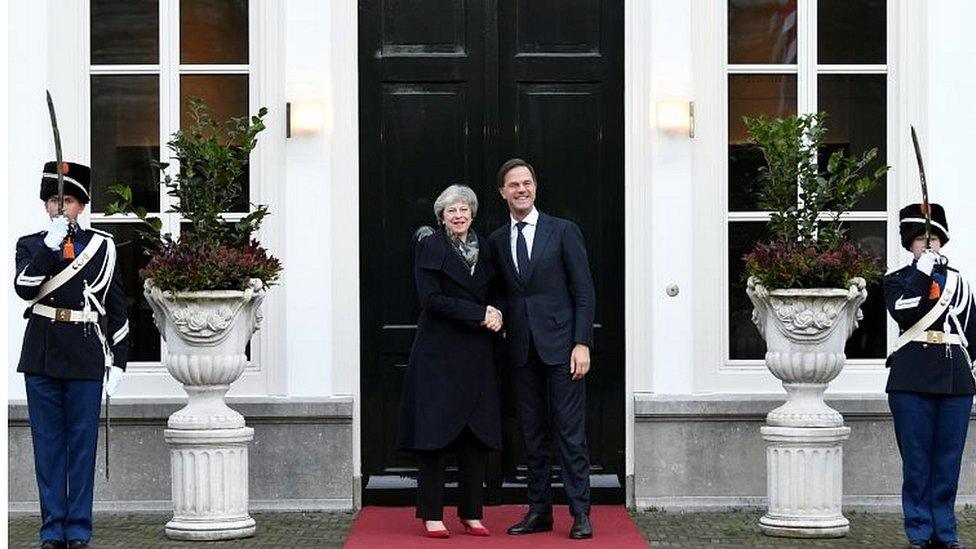
Theresa May's first meeting was with Dutch Prime Minister Mark Rutte
May faces backlash from MPs
The prime minister's U-turn sparked anger among MPs on all sides, who had spent three days debating the deal and had been promised the final say on it on Tuesday.
Buzzfeed , externalclaimed Mrs May had informed some EU leaders about her plan to abandon the vote on Sunday - well before she told the cabinet.
Speaking during an emergency debate in the Commons on the government's handling of the aborted Brexit vote, Mr Corbyn said such reports were "disturbing" and urged Mrs May to "admit her deal is dead".
"What is she doing in Europe? This runaway prime minister is not even seeking to negotiate. She confirmed she is only seeking reassurances. Our prime minister is traipsing round the continent in pursuit of warm words."
Labour late won a non-binding vote criticising the government's handling of the issue by 299 to zero after Conservative MPs chose not to take part.
Meanwhile, more backbench Tory MPs are considering submitting letters of no confidence in Theresa May in the hope of toppling her and forcing a Tory leadership contest. If she was no longer Conservative Party leader she would also be expected to step down as prime minister.
So far 26 MPs have publicly said they have written such letters - 48 of them are needed to trigger a vote.
The BBC's political editor Laura Kuenssberg said senior Tories were sounding "more confident" that the threshold had been reached.
Allow X content?
This article contains content provided by X. We ask for your permission before anything is loaded, as they may be using cookies and other technologies. You may want to read X’s cookie policy, external and privacy policy, external before accepting. To view this content choose ‘accept and continue’.
Separately, Labour is coming under pressure from the SNP, Lib Dems, Plaid Cymru and the Green Party to call a vote of no confidence among all MPs to try and bring down Theresa May's government - something that can, effectively, only be done by the main opposition party.
The Labour leader told MPs he had no confidence in the government but his party needed "to do the appropriate thing at the appropriate time" if it was to succeed in bringing it down.
Analysis: Confused and angry
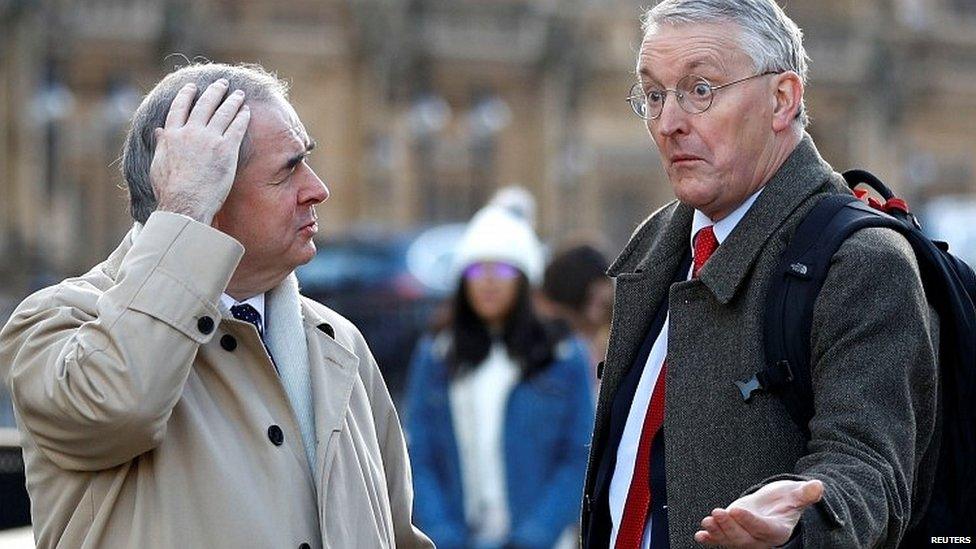
Even old hands in Westminster are struggling to make sense of what is going on
By BBC political correspondent Nick Eardley
Parliament feels like a confused and sometimes angry place today. As Theresa May fights for further assurances on the backstop, many are unconvinced. Even among Conservatives loyal to her, the mood is bleak.
One Tory MP who supported the PM's deal told me they didn't have a clue what was happening now. "We're rewriting the pantomime," they added. Another pondered: "The Conservatives made this muddle - who is going to fix it?" One minister concluded things were at "breaking point".
Brexiteers speak openly of exasperation.
One source, who has been highly critical of the plan but not the PM, told me many were changing their minds now; Mrs May is now seen as the problem. It's not the first time we've heard such claims - and in the past they haven't materialised.
But this person said a number of Brexit backers who have resisted pressure to send in letters calling for a vote of no confidence in the PM as Tory leader have now changed their minds.
"And it's not just the usual suspects," they added.
- Published10 December 2018
